Saudi Arabia Concerned Over Iran's Uranium Enrichment, FM Says
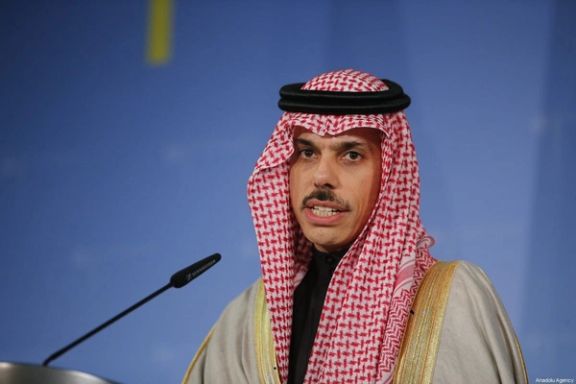
Exploratory talks with Iran have been cordial but not substantive, Saudi Arabia’s foreign minister has told France-24 in an interview published on Saturday.

Exploratory talks with Iran have been cordial but not substantive, Saudi Arabia’s foreign minister has told France-24 in an interview published on Saturday.
“We are committed to a substantive discussion with Iran on addressing concerns that we and other countries in the region have…but that would require to address all the concerns that we all have,” Prince Faisal bin Farhan Al Saud said.
He added that although no substantive progress has been achieved in four rounds of talks but, “we have made enough progress that would allow us to move forwards.”
Asked about Saudi concerns over the progress of multilateral talks aimed at reviving the 2015 nuclear deal, known as JCPOA, bin Farhan said that his country has “significant doubts” about where the talks are going. He went on to say that these doubts have been reinforced in recent months by Iran’s nuclear activities. He also said Riyadh is concerned about restrictions on IAEA nuclear monitoring in Iran.
Tehran has accelerated uranium enrichment and has said it now has a stockpile of more than 200 kilograms of 20-percent enriched fissile material and another 25 kg of 60-percent purified uranium. This takes Iran closer to the threshold of having enough 90-percent enriched uranium for a nuclear bomb.
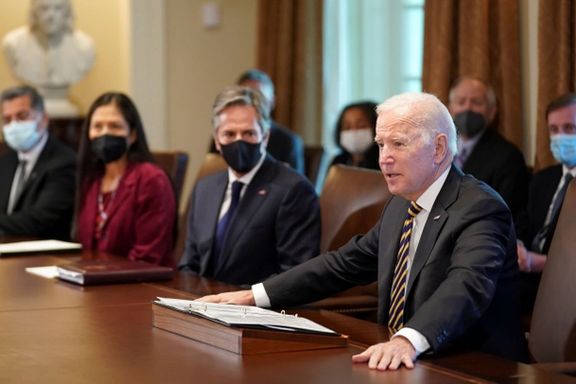
US President Joe Biden said in a memo to his officials on Friday that there were sufficient supplies of oil so other countries can reduce purchases from Iran.
The White House is required to affirm every six months that there is enough oil supply globally to maintain sanctions against Iran that were put in place in 2012, during Barack Obama's administration.
Biden's memo sent to Secretaries of State, Treasury and Energy comes in advance of a virtual meeting with China's President Xi Jinping on Monday, in what is expected to be the leaders' most extensive meeting since Biden took office.
Iranian media reported Biden’s statement amid general pessimism about the outcome of the talks to restore the 2015 nuclear agreement (JCPOA) and have the US sanctions lifted. The government’s news website IRNA, however, was quick in trying to instill optimism quoting a member of parliament’s energy committee on Saturday who said exports have gradually increased in the past few months.
China is the largest purchaser of Iranian oil, averaging purchases of more than 500,000 barrels a day over the last three months.
Chinese purchases of Iranian crude have continued this year despite sanctions that, if enforced, would allow Washington to cut off those who violate them from the US economy.
The Biden administration is currently not enforcing those sanctions ahead of forthcoming negotiations with Iran to revive the JCPOA.
"Consistent with prior determinations, there is a sufficient supply of petroleum and petroleum products from countries other than Iran to permit a significant reduction in the volume of petroleum and petroleum products purchased from Iran by or through foreign financial institutions," Biden said in the memo.
Biden administration diplomatic attempts to enforce the oil sanctions by persuading China to reduce purchases remain confidential, but critics believe the administration has not acted with determination to stop the trade.
Biden’s argument about sufficient oil supplies, however, is not so strong amid prices that have exceeded $80 a barrel. As gasoline prices have been rising in the United States, there is talk this week of the government releasing supplies form the Strategic Petroleum Reserves (SPR).
Almost all of Iran’s oil to China is shipped in illicit ways, with tankers transferring oil on high seas and documents fabricated to show other sources for cargoes. But Iranian officials and government-controlled media have claimed in recent months that Iran has been successful in exporting more oil to China.
No one knows how Chinese importers pay Tehran amid US banking sanctions on Iran but the role of intermediaries in selling cargoes to China and making payments to Iran has been reported. This means Iran is not recouping the full value of its exports.
With reporting by Reuters

Hundreds of residents of Esfahan joined farmers protesting against water shortage and the drying up of the river, Zayandeh Roud, that flows through the city.
Footage aired by state television and social-media posts showed protesters marching in the dry river bed towards the 17th-century Khajou Bridge Friday.
They chanted "Flowing Zayandeh Roud Is Our Indisputable Right," a play on the slogan "Nuclear Energy Is Our Indisputable Right," "We Support Farmers," often chanted at state-sanctioned rallies. "Give Back Our Zayandeh Roud, Give Back Isfahan Its Breath," and "There Will Be Unrest In Esfahan If the River Doesn't Flow," protesters chanted.
Drought and global warning have led to water shortages across the region in recent years, including Syria, Iraq where crop production has been halved, and Saudi Arabia, where King Salman recently asked subjects to pray for rain. In Iran as elsewhere there have been tensions between communities vying for water supply.
But the water crisis has been getting worse in Iran for the past decade because of mismanagement in constructing unnecessary dams, encouraging water-thirsty crops like rice and political influence in water distribution.
Zayandeh Roud – which starts from the Zagros Mountains, whirls through Esfahan and disappears in wetlands east of the city – has been completely dry most of the year for two decades. Esfahani farmers started a new round of protests Monday.
Protesters sleeping in tents pitched in the dry riverbed at night say water “traditionally” allocated to farmers has gone to businesses or to other provinces, and that the Esfahani farmers cannot sow autumn crops, including wheat, while their livestock is damaged.
Ali-Akbar Mehrabian, the energy minister, flew to Esfahan Friday to investigate the situation, with some protestors blaming power industries for using water.
"We have come from east and west to seek what is our right. We are neither thugs and hooligans, nor preying on other's livelihood. We are a group of hardworking farmers with calluses on our hands and bare feet. Our men and women's subsistence depends on farming, " one farmer said in a speech to protesters on Tuesday alluding to often-used accusation of being "thugs and hooligans" brought against protesters by the authorities.
There has been land subsidence in the city and at the city airport due to water scarcity, the farmer said. Photos posted to social media show cracks in the ground around the airport, and hollows and cracks in and around Esfahan’s historical buildings and monuments.
Farmers in Esfahan have held several protests this year despite a warning by Esfahan's Revolutionary Prosecutor's Office on April 24 to avoid rallies without a permit. The prosecutor warned that unlicensed protests risked "misuse" by people with "destructive goals." Khuzestan protests in July over water lasted for nearly two weeks, in which at least 12 people were killed when security forces used force.
Government critics blame the water situation an emphasis on attempts to achieve self-sufficiency in agriculture, including water-intensive crops such as rice and other grains.
Ali Salajegheh, Iran’s representative at Cop26 in Glasgow, Scotland, told the BBC Thursday, that Iran would sign the Paris accords once sanctions were lifted. "Iran has been impacted by climate change like every other place in the world," he said. "This has reduced our rainfall per annum and also the inflow of water into our rivers has reduced by 40 percent this has affected our agriculture and affected our industrial and drinking water."
Iran is the world's eighth largest CO2 emitter yet is one of the few countries not to ratify the 2015 Paris pact.
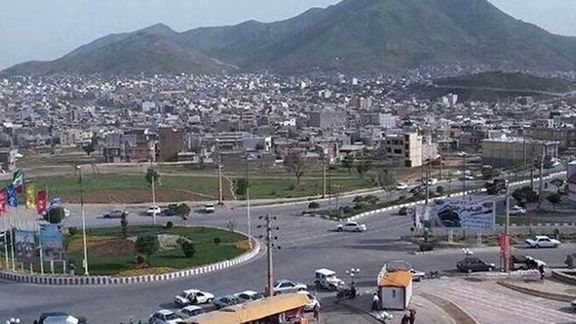
Scores of Iranian Kurds have been arrested in two regions in the Iranian Kurdistan province, two human rights monitoring groups reported on Friday.
Several residents in villages around the town of Saqez were rounded up by security forces and taken to an unknown location, Hengaw, a Kurdish rights group said. Abdollah Mahjuz, a former political prisoner and his cousin Mohammad Mahjuz were among those detained.
The reason for the arrests is not clear, but security forces regularly detain Kurdish citizens on suspicions of political activities or membership in underground groups.
Hengaw also reported that 20 people were arrested around the town of Baneh in Kurdistan. The Kurdistan Human Rights Network, another monitoring group, also reported that dozens of agents in civilian clothes stormed several other villages near Baneh and arrested ten people. Local sources told the rights group that agents entered home and after confiscating personal items, detained citizens with verbal and physical violence. In some cases, agents beat up family members who prevented their illegal entry into their homes.
These reports also said that security personnel are present in Baneh’s streets and nearby villages.

The FBI has warned US companies that Iranian hackers are searching cybercriminal websites to obtain stolen information to use in their future activities.
The warning was issued in a private industry notification, first reported by Bleeping Computer, a cybersecurity news website on Wednesday.
Iran has a strong network of state hackers who regularly target American, Israeli and other government and company computers, both for disruption and for obtaining sensitive information.
The Federal Bureau of Investigation warned that any information obtained from the dark web by Iranian hackers can be used to penetrate the networks of more organizations.
While it is not clear which Iranian group is involved in the attempt to get information from cybercriminals, the FBI warned organizations to take steps to protect themselves against future attempts by these operators who both pursue ransom and security objectives.
Some cybersecurity experts believe that targeting entities for ransom by Iranian hackers could be a tactic to blur the line between criminal and state operatives, pretending they pursue profits rather than espionage.
In late October, an Iranian hacking group called Black Shadow attacked an Israeli data and internet company, stealing a large amount of client information and demanding ransom.

A major shift in a reformist party in Iran is likely to change the Islamic Republic's political landscape and help restore the reformists' status in the system.
The right-of-center reformist Executives of Construction Party in Iran has kicked out Gholamhosein Karbaschi, a moderate conservative politician who has been leading the party for a quarter of a century and replaced him with a more proreform figure, Hossein Marashi, the party's former spokesman.
Some have noted that Karbaschi knew he was going to be replaced in a Tuesday evening meeting of the party's central council, which he did not attend.
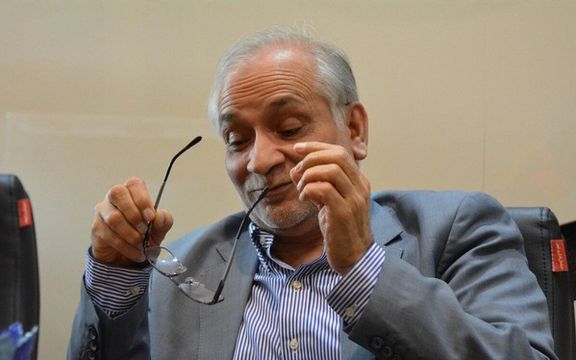
According to reformist daily Arman, the party's central council members decided unanimously to fire Karbaschi and replace him with Marashi, a relative of former President Akbar Hashemi Rafsanjani who was the founding father of the Executives of Construction when it was established in 1996. Marashi led the party's left wing throughout the past 25 years. The wing was identified with Rafsanjani's outspoken daughter Faezeh Hashemi who refused to take part in party meetings for several years in protest to Karbaschi's leadership.
Several key members of the party quit during the past few years, but the drop in membership and the rift among key members of the central council has been more visible in the past two years, as dissatisfaction with Karbaschi's handling of the parliamentary and presidential elections in 2020 and 2021 utterly annoyed even some loyal members. Mohammad Atrianfar, a key member said those who have left the party can easily return as the central council has not approved their resignation.
In the meantime, hardline news outlets such as the IRGC-linked Tasnim news agency have expressed support for Karbaschi and maintained their critical view of the party, Arman newspaper observed.
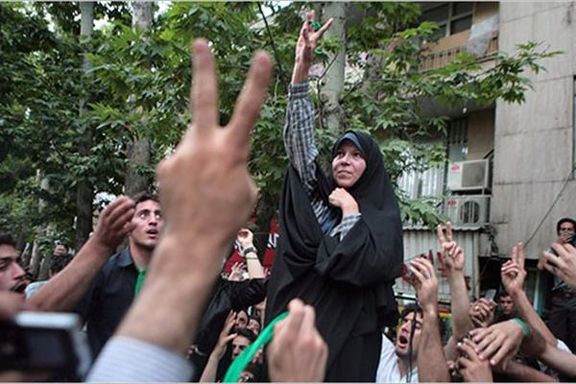
Meanwhile, a commentary in reformist daily Etemad characterized the development as a sign of the party moving to the left. In other words, the Executives of Construction is likely to be branded as an all-out reformist party.
According to Sharq newspaper, some of the inactive members including Akbar Torkan, a proreform figure with close ties to Supreme Leader Ali Khamenei, were present at the party's central council meeting. Some media outlets have taken this as a sign that the presence of trusted individuals like Torkan can strengthen the party's position within the ruling establishment. If Khamenei deicides, as he did before, that the country needs two political wings, then the Executives of Construction can act as the reformist wing. Currently, ultraconservatives dominate state institutions.
The meeting on Tuesday night gave the upper hand within the party to the Rafsanjani clan with Marashi as secretary general, Rafsanjani's son as the head of the central council and the high likelihood of Faezeh Hashemi's return to the forefront of the party's leadership.
According to the moderate website Rouydad24, under Karbaschi, during the past two years, the party lost its political impact in both local and national elections. The party's candidate for the presidential election, Abdolnaser Hemmati, who was supported by only part of the party, badly lost the election. To make the situation even worse for Karbaschi, the website quoted Atrianfar as having said that the party's central council did not meet during the past year or so, meaning that it was Karbaschi and not the party that nominated Hemmati.